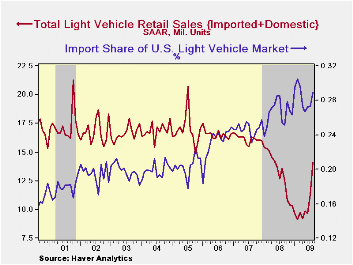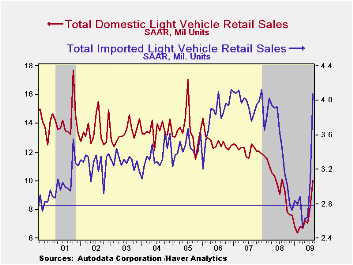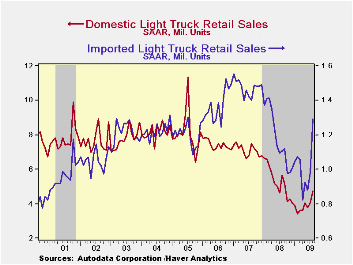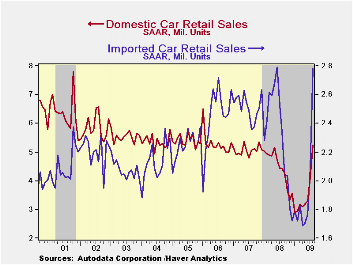 Global| Sep 01 2009
Global| Sep 01 2009Three Weeks Of "Cash for Clunkers" Program Spurs August U.S. Vehicle Sales To Highest Since May 2008
by:Tom Moeller
|in:Economy in Brief
Summary
The U.S. government's "Cash for Clunkers" (CARS) program was in full force during the final three weeks of last month. The program gave car buyers up to $4,500 for trading in older, gas-guzzling vehicles if they bought more fuel [...]

The U.S. government's "Cash for Clunkers" (CARS) program was
in full force during the final three weeks of last month. The program
gave car buyers up to $4,500 for trading in older, gas-guzzling
vehicles if they bought more fuel efficient cars & light
trucks. An estimated 700,000 clunkers were taken off the road (to be
scrapped) and replaced by more fuel efficient vehicles. The program
cost the Federal Government $2.877 billion. Indeed, the CARS program
seems to have stimulated sales of new vehicles.  U.S. unit
sales of light vehicles during August jumped 25.4% m/m to
14.09M units which was their highest since May of 2008, according to
the Autodata Corporation. (Seasonal adjustment of the figures is
provided by the U.S. Bureau of Economic Analysis). August sales were
indeed higher than the expected 13.2M sales rate. The question now is
to what degree these sales borrowed from the future?
U.S. unit
sales of light vehicles during August jumped 25.4% m/m to
14.09M units which was their highest since May of 2008, according to
the Autodata Corporation. (Seasonal adjustment of the figures is
provided by the U.S. Bureau of Economic Analysis). August sales were
indeed higher than the expected 13.2M sales rate. The question now is
to what degree these sales borrowed from the future?
Sales of domestically made vehicles jumped 22.6% m/m to 10.02M units but they still were down 0.9% y/y. Sales of fuel efficient cars rose 28.0% m/m and that lifted them by 18.7% y/y. Light truck sales posted a 17.1% m/m gain that still left them down 16.3% versus last August. Year-to-date, sales of domestic vehicles overall are up 31.5% following last year's 35.8% drop from December-to-December.
 Imported light vehicles similarly
benefitted from the government's sales program. A 32.9% m/m rise to
4.08M units actually exceeded the sales gain for domestics and brought
them up 18.1% y/y. Sales of imported autos rose by more than one-third
from July and were at their highest level since last June. Sales of
imported light trucks similarly rose by nearly one-third m/m and rose
16.7% y/y. Year-to-date sales of imported vehicles rose by nearly
one-half following last year's 33.9% decline.
Imported light vehicles similarly
benefitted from the government's sales program. A 32.9% m/m rise to
4.08M units actually exceeded the sales gain for domestics and brought
them up 18.1% y/y. Sales of imported autos rose by more than one-third
from July and were at their highest level since last June. Sales of
imported light trucks similarly rose by nearly one-third m/m and rose
16.7% y/y. Year-to-date sales of imported vehicles rose by nearly
one-half following last year's 33.9% decline.
Overall, import's share of the U.S. light vehicle market rose to 28.9% last month after reaching 26.5% during all of last year. (Imported vehicles are those produced outside the United States.) Imports' share of the U.S. car market totaled 34.6%, versus 34.3% last year while the share of the light truck market was 21.4%, up from 18.3 % last year.
 By maker, GM car sales in August fell 4.6%
from last August but Ford's sales rose 24.9% y/y. Chrysler sales fell
13.0% but sales of Toyotas rose a strong 19.7%. Sales of Nissan autos
jumped 38.4% while Subaru car sales soared 54.7%. Sales of the high-end
Mercedes autos fell 17.5% y/y and sales of BMW's were off 16.3%. In the
light truck market, GM's sales fell by nearly one-third y/y but Ford's
sales increased 12.9%. Chrysler's truck sales fell 16.2% and Toyota
truck sales similarly fell 14.6%. Sales of Nissan's light trucks were
off by nearly one-half versus last August but Subaru's sales rose by
nearly one-half.
By maker, GM car sales in August fell 4.6%
from last August but Ford's sales rose 24.9% y/y. Chrysler sales fell
13.0% but sales of Toyotas rose a strong 19.7%. Sales of Nissan autos
jumped 38.4% while Subaru car sales soared 54.7%. Sales of the high-end
Mercedes autos fell 17.5% y/y and sales of BMW's were off 16.3%. In the
light truck market, GM's sales fell by nearly one-third y/y but Ford's
sales increased 12.9%. Chrysler's truck sales fell 16.2% and Toyota
truck sales similarly fell 14.6%. Sales of Nissan's light trucks were
off by nearly one-half versus last August but Subaru's sales rose by
nearly one-half.
The U.S. vehicle sales figures can be found in Haver's USECON database and the company sales figures are in the INDUSTRY database.
Economy to turn the corner in 2010 from the Federal Reserve Bank of Chicago is available here.
| Light Vehicle Sales (SAAR, Mil. Units) | August | July | June | August Y/Y | 2008 | 2007 | 2006 |
|---|---|---|---|---|---|---|---|
| Total | 14.09 | 11.24 | 9.70 | 3.9% | 13.17 | 16.16 | 16.54 |
| Autos | 8.05 | 6.20 | 5.04 | 18.7 | 6.71 | 7.58 | 7.77 |
| Domestic | 5.26 | 4.11 | 3.28 | 18.7 | 4.42 | 5.07 | 5.31 |
| Imported | 2.78 | 2.09 | 1.76 | 18.8 | 2.29 | 2.52 | 2.45 |
| Light Trucks | 6.05 | 5.04 | 4.66 | -10.9 | 6.47 | 8.60 | 8.78 |
| Domestic | 4.75 | 4.06 | 3.78 | -16.3 | 5.29 | 7.10 | 7.42 |
| Imported | 1.29 | 0.98 | 0.88 | 16.7 | 1.18 | 1.47 | 1.37 |
Tom Moeller
AuthorMore in Author Profile »Prior to joining Haver Analytics in 2000, Mr. Moeller worked as the Economist at Chancellor Capital Management from 1985 to 1999. There, he developed comprehensive economic forecasts and interpreted economic data for equity and fixed income portfolio managers. Also at Chancellor, Mr. Moeller worked as an equity analyst and was responsible for researching and rating companies in the economically sensitive automobile and housing industries for investment in Chancellor’s equity portfolio. Prior to joining Chancellor, Mr. Moeller was an Economist at Citibank from 1979 to 1984. He also analyzed pricing behavior in the metals industry for the Council on Wage and Price Stability in Washington, D.C. In 1999, Mr. Moeller received the award for most accurate forecast from the Forecasters' Club of New York. From 1990 to 1992 he was President of the New York Association for Business Economists. Mr. Moeller earned an M.B.A. in Finance from Fordham University, where he graduated in 1987. He holds a Bachelor of Arts in Economics from George Washington University.
More Economy in Brief
 Global| Feb 05 2026
Global| Feb 05 2026Charts of the Week: Balanced Policy, Resilient Data and AI Narratives
by:Andrew Cates






